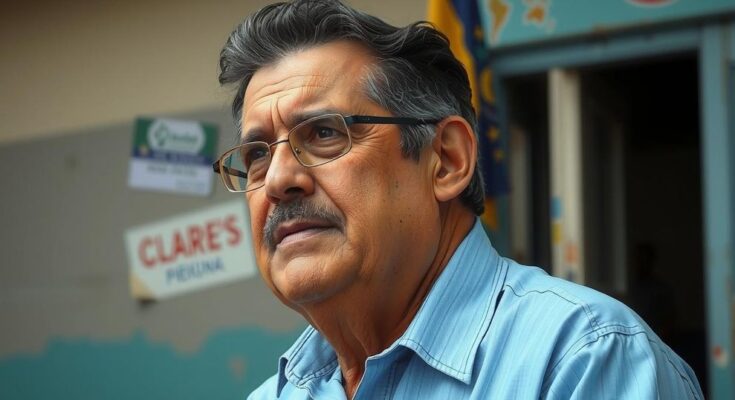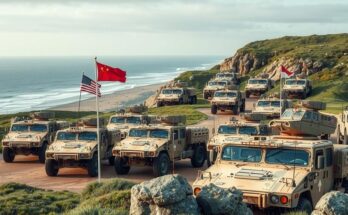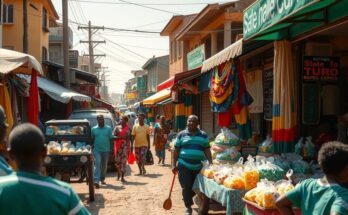Edmundo González, a self-exiled Venezuelan opposition leader, is seeking international support to validate his claim of triumph against Nicolás Maduro in the disputed July elections. In a meeting with Panamanian President José Raúl Mulino, he presented electoral documents asserting his victory. As he embarks on a diplomatic tour across Latin America, tensions rise ahead of Maduro’s inauguration, while the opposition continues to denounce the legitimacy of the election results, amid severe repression and threats from the regime.
Edmundo González, the Venezuelan opposition leader in self-exile, has intensified his campaign for international support to validate his claim of victory against Nicolás Maduro in the recently contested presidential election held in July. While in Panama, González presented what he described as the electoral tally sheets indicating his decisive win, despite Maduro’s scheduled inauguration drawing near. In a significant show of support, he was accompanied by former Latin American leaders during his meeting with Panamanian President José Raúl Mulino at the presidential palace, where he showcased the documents. González has previously garnered attention by meeting with prominent figures, including U.S. President Joe Biden and leaders from Argentina and Uruguay, emphasizing his commitment to gaining backing for his cause.
The regional response to González’s claims has been mixed, with Maduro’s government vehemently denying them. The meeting in Panama represents yet another strategic move in González’s high-profile diplomatic efforts since his departure from exile in Madrid. Nevertheless, his strategy for regaining power remains unclear, particularly given Maduro’s regime’s control over essential institutions, including the military, and the issued arrest warrant against him.
Colombian President Gustavo Petro, previously supportive of Maduro, has recently distanced himself by refusing to attend Maduro’s inauguration, a decision influenced by heightened tensions following the arrest of a human-rights activist in Venezuela. Petro’s shift may offer critical support to Venezuela’s opposition amid increasing hardships. González’s diplomatic tour further extends to other nations, culminating in a contentious return to Venezuela, where he plans to assert himself as president.
The opposition has condemned the election as fraudulent due to extensive reports of irregularities and state repression. Although González asserts that the grassroots movement for monitoring polling stations may validate his claims of a landslide victory, there remains a significant challenge in overcoming the regime’s ongoing crackdown on dissent, which has resulted in numerous arrests of activists and opposition figures.
González has also raised alarms, claiming his son-in-law has been kidnapped, underscoring the perils faced by opposition members under the Maduro regime. Meanwhile, Panamanian support for González remains firm, with President Mulino reaffirming his country’s stance on the electoral situation. Panama was among the first to call for a comprehensive reevaluation of the election results and has recently suspended diplomatic relations with Caracas due to the electoral dispute.
As González prepares for his return to Venezuela, uncertainty shrouds his potential impact, given the entrenched nature of Maduro’s forces in the country. The upcoming inauguration may further escalate the ongoing standoff between the opposition and the regime. With the Venezuelan crisis unresolved, González’s declaration of victory heralds a critical period that could redefine the country’s political future amid regional power dynamics.
The political landscape in Venezuela has been tumultuous, primarily due to ongoing disputes over election legitimacy. Nicolás Maduro’s government has faced significant criticism regarding its electoral practices, leading to widespread claims of corruption and human rights violations. Edmundo González’s emergence as a prominent opposition figure, especially in light of the disputed July elections, highlights the struggle for democratic governance in Venezuela. His diplomatic efforts and international outreach are aimed at garnering legitimacy and support for his claims while challenging Maduro’s authority, which is bolstered by control over state institutions. The backdrop of regional political shifts, particularly the distancing of leaders like Gustavo Petro from Maduro, adds complexity to the situation, providing opportunities for the opposition amid systemic repression.
In conclusion, Edmundo González’s ongoing efforts to dispute the legitimacy of the Venezuelan elections underscore the deepening political crisis in the country. His international diplomatic venture, supported by Panama and other Latin American leaders, aims to solidify his claim to victory against Nicolás Maduro. However, with the regime’s entrenched hold on power and escalating risks for dissenters, the path to reclaiming authority remains fraught with challenges. As both political factions prepare for an uncertain future, the developments surrounding González’s return to Venezuela will be decisive for the nation’s trajectory.
Original Source: www.newsweek.com




